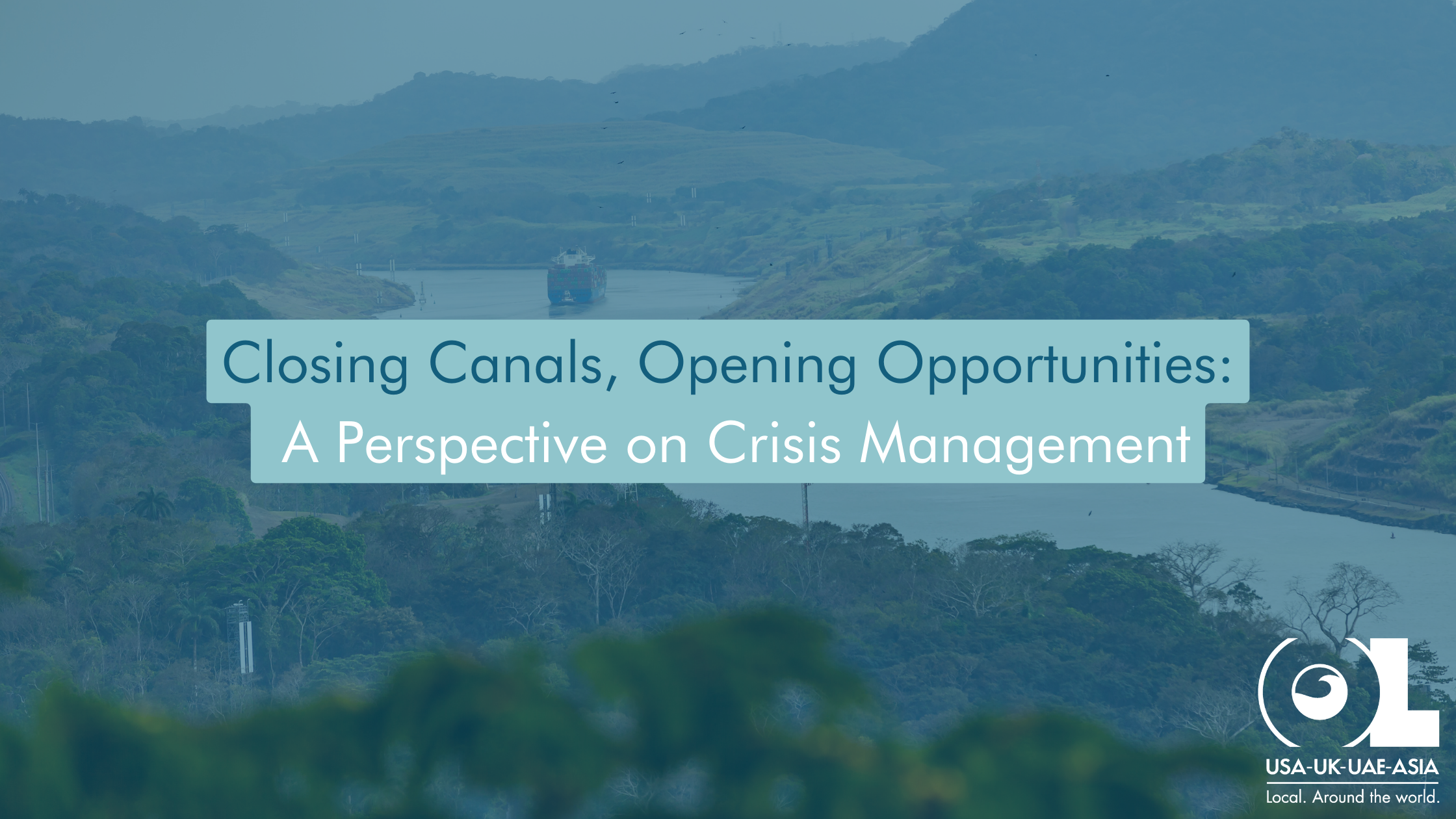Navigating Through Canal Crises
In recent times, two of the world’s most strategic maritime passages, the Panama and Suez Canals, have encountered significant challenges that have rippled across global trade and logistics. The Panama Canal, an indispensable conduit for $270 billion in annual global trade, is grappling with a severe drought that has drastically reduced its operational capacity. This situation has not only led to a dramatic reduction in the number of vessels that can traverse the canal daily but has also spurred a crisis in water management, essential for its operation.
Simultaneously, the Suez Canal, another pivotal artery in global shipping, faced its own challenges with the infamous Ever Given blockade in March 2021, and the ongoing geopolitical tensions in the region continue to pose risks for uninterrupted access. These events underscore the fragility of our global supply chains and the outsized role these canals play in facilitating international trade.
These crises, however, also present unique opportunities, especially when navigated with the strategic insight and operational agility of Third-Party Logistics (3PL) partners. 3PLs specialize in crafting customized logistics solutions, making them invaluable in times of crisis. By leveraging their expertise, networks, and innovative approaches, 3PLs can transform these challenges into opportunities for optimization and growth.
Immediate Impacts on Shipping Times, Costs, and Logistics Strategies:
- Extended Shipping Times: The closure of both the Panama and Suez Canals would necessitate longer shipping routes. Vessels typically benefit from these canals’ shorter paths between major global markets. Without these shortcuts, ships would have to navigate around continents, like sailing around the southern tip of South America or Africa, significantly increasing transit times.
- Increased Costs: Longer routes not only mean more time but also higher costs. This includes increased fuel consumption, additional crew wages, and potential late delivery penalties. For businesses relying on just-in-time delivery, these delays could disrupt production schedules and increase inventory costs.
- Altered Logistics Strategies: Companies would need to rapidly adjust their logistics strategies. This might involve switching to different modes of transportation, like air freight for urgent deliveries, albeit at a much higher cost. There could also be a greater reliance on regional manufacturing and supply chains to mitigate these disruptions.
Potential Ripple Effects on Businesses and Economies Worldwide:
- Global Supply Chain Disruption: The closure of these canals doesn’t just affect the shipping industry; it ripples through the entire global supply chain. This could lead to shortages of goods, ranging from raw materials to finished products, potentially stalling manufacturing processes in various industries.
- Inflationary Pressures: As shipping costs rise, these increases are often passed on to consumers, contributing to inflation. Essential goods, including food and fuel, could see price hikes, impacting both individual households and the broader economy.
- Economic Slowdown: Prolonged disruptions can lead to a slowdown in economic activities. Countries heavily reliant on exports and imports through these canals may experience significant impacts on their trade balances and GDP growth.
- Shifts in Trade Routes and Alliances: Over time, businesses and nations might seek alternative trade routes and form new logistical alliances. This could reshape global trade patterns, potentially leading to a reevaluation of current trade agreements and strategies.
3PLs: Navigating Through Crisis with Expertise and Innovation
- Expertise in Complex Logistics Solutions: 3PL providers are logistics experts, adept at handling complicated supply chain challenges. In a crisis like canal closures, their deep understanding of global logistics networks becomes invaluable. They can quickly analyze the situation, identify potential impacts, and devise effective strategies to maintain the flow of goods.
- Access to a Broad Network: One of 3PLs’ most significant advantages is their extensive global network. This includes relationships with a variety of shipping companies, access to multiple transportation modes (air, sea, road, rail), and connections with local logistics providers. Such a network allows 3PLs to swiftly pivot and find alternative routes and transportation methods, minimizing disruptions.
- Technological Capabilities: Modern 3PLs leverage advanced technology for real-time tracking, route optimization, and predictive analytics. During crises, these technologies enable them to quickly assess various scenarios, reroute shipments efficiently, and provide clients with up-to-date information, ensuring transparency and trust.
- Experience in Crisis Management: 3PLs are seasoned in handling unexpected disruptions. Their experience in dealing with various logistics challenges, from natural disasters to political upheavals, positions them well to manage crises effectively.
Examples of 3PL Crisis Management:
- COVID-19 Pandemic Response: During the COVID-19 pandemic, many 3PLs demonstrated remarkable agility. They rapidly adjusted to lockdowns and border closures, rerouting shipments and utilizing different transportation modes to ensure the continuity of supply chains. Some even expedited the shift to e-commerce logistics to meet changing consumer demands.
- Natural Disaster Responses: In response to natural disasters like hurricanes or earthquakes, 3PLs have historically played a critical role in rerouting supplies, providing emergency logistics services, and even aiding in recovery efforts by ensuring the timely delivery of essential goods and materials.
- Political and Economic Turbulences: During events like the Brexit transition, 3PLs helped businesses navigate new customs regulations and border controls, minimizing trade disruptions between the UK and EU.
In essence, 3PLs are not just service providers; they are strategic partners capable of turning logistical nightmares into manageable challenges. Their expertise, network, technological prowess, and experience are pivotal in mitigating risks and ensuring the continuity of business operations during global crises like canal closures. By leveraging their capabilities, businesses can navigate these turbulent times more effectively and maintain a competitive edge in the face of adversity.
Transforming Challenges into Opportunities
In the face of unprecedented challenges like the closure of major trade arteries, there lies a hidden opportunity for businesses to innovate and strengthen their supply chains.
- Catalyst for Innovation: Times of crisis often act as a forcing function for innovation. Businesses can use these situations to rethink and revamp their supply chain strategies. This could mean adopting new technologies, exploring different transportation modes, or integrating more sustainable practices. For instance, a company might turn to AI-driven logistics platforms to enhance efficiency or explore greener shipping alternatives that also align with their CSR goals.
- Benefits of Diversification: Diversifying supply chain routes and partners is akin to not putting all your eggs in one basket. By exploring alternative shipping routes, using multiple transportation modes, and partnering with a variety of suppliers and logistics providers, businesses can reduce their dependency on any single element. This diversification not only mitigates risks but can also uncover more cost-effective and efficient logistics solutions.
- 3PLs as Strategic Partners: 3PL providers are more than just external service providers; they’re strategic partners in transforming logistical challenges into advantages. With their expertise, they can help businesses navigate through the crisis, find the best alternative routes and methods, and even identify potential improvements that can be made to the supply chain for long-term benefits.
Preparing for the Future
The closure of the Panama and Suez Canals serves as a wake-up call for businesses to proactively plan and prepare for future disruptions.
- Importance of Proactive Planning: Proactive planning is the cornerstone of a resilient supply chain. This involves regularly assessing potential risks, developing contingency plans, and staying informed about global events that could impact logistics.
- Building Resilient Supply Chains with 3PLs: 3PL providers play a crucial role in building resilience into supply chains. They offer a wealth of knowledge and resources that can help businesses prepare for various scenarios. This includes assisting in risk assessment, developing flexible logistics strategies, and providing access to a wide range of global logistics options.
- Opportunity for Reevaluation and Strengthening: This crisis presents an invaluable opportunity for businesses to reevaluate and fortify their supply chains. It’s a chance to examine current practices, identify vulnerabilities, and implement improvements. Businesses should see this as a proactive step towards not just recovery, but growth and enhanced capability in an ever-changing global market.
In summary, while the closure of key canals presents significant challenges, it also offers a unique opportunity for businesses to innovate, diversify, and strengthen their supply chains with the aid of expert 3PL partners. By embracing these challenges as catalysts for change and preparation, businesses can emerge more robust and adaptable, ready to tackle future uncertainties with confidence.



